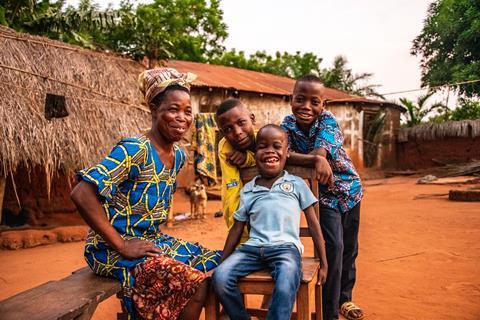Advertisement feature

Don’t lose hope. That’s the message from international child development charity, Compassion UK, as a survey finds less than half (49%) of UK adults believe it is possible to end extreme poverty worldwide. This number was only slightly higher for Christians - 59% - and only 58% of Christians thought that eradicating extreme poverty is a priority for the world currently.
Even the United Nations admit their aim of ending poverty in all its forms has become harder than ever. COVID-19 posed a huge setback to poverty-reducing efforts and the rapid decrease in extreme poverty rates in recent years has stopped. In fact, if trends persist, an alarming 575 million people will still be living in extreme poverty by the end of the decade.
But this isn’t a reason to give up.
On this year’s International Day for the Eradication of Poverty (17 October), Compassion is encouraging UK Christians to strengthen our determination —by God’s grace and through His power— to continue tackling poverty and caring for the poor. As the UN have stated: “Poverty and inequality are not inevitable. They are the result of deliberate decisions or inaction that disempower the poorest and marginalised in our societies and violate their fundamental rights.”
Taking hope in God’s Global Church
Despite the outlook, we can gain great encouragement from the initiatives being driven by local churches. For example, Compassion’s 8,500 partner churches are providing opportunities to children and young people that will lift them out of poverty and bring change to families, communities and even nations.
“There is hope in the fight to eradicate poverty – I have myself as an example for that,” shares Noirine Khaitsa, from Uganda, who grew up in a poverty context and now works as a senior manager at Compassion International Uganda, helping to connect others with the programme that changed her life. “The local church knows their community and are able to care for and care about children and families affected by poverty. At the end of the day, a child in poverty needs a safe community around them, that is encouraging them and that is applying relevant holistic support like education, medical treatment and income generation training. Locally-led programmes help achieve this.”
Mark Preston, Compassion UK’s Senior Director of Partnerships, agrees, “It’s more important than ever not to lose hope – while COVID has put a spanner in the works of poverty eradication, now is the time we need to take action to make sure this setback isn’t permanent. At Compassion, we believe the Church has a crucial role to play in addressing extreme poverty and we’re encouraged by the impact right now. There is a transformative and exponential impact in a locally-led approach.”

In Togo, for instance, as part of the Compassion programme, young people are participating in vocational training workshops such as welding, carpentry and mat weaving as well as life skills training including entrepreneurship, healthy eating and budgeting. Compared to children not enrolled in the Compassion programme, Compassion youth in Togo were 53% more likely to have participated in a formal technical and vocational education and training programme and 97% more likely to have participated in a non-formal technical and vocational education and training programme.
Mark Preston adds, “The church hasn’t forgotten the poor. In fact, far from it – God’s church is His hands and feet to tackle poverty. In the UK, churches are addressing poverty in their own communities through food banks and warm spaces and also standing shoulder to shoulder with the Church across the world, supporting them financially and through prayer.”
God’s Church continues to be on the move.
Join Compassion UK in praying for the eradication of poverty

























